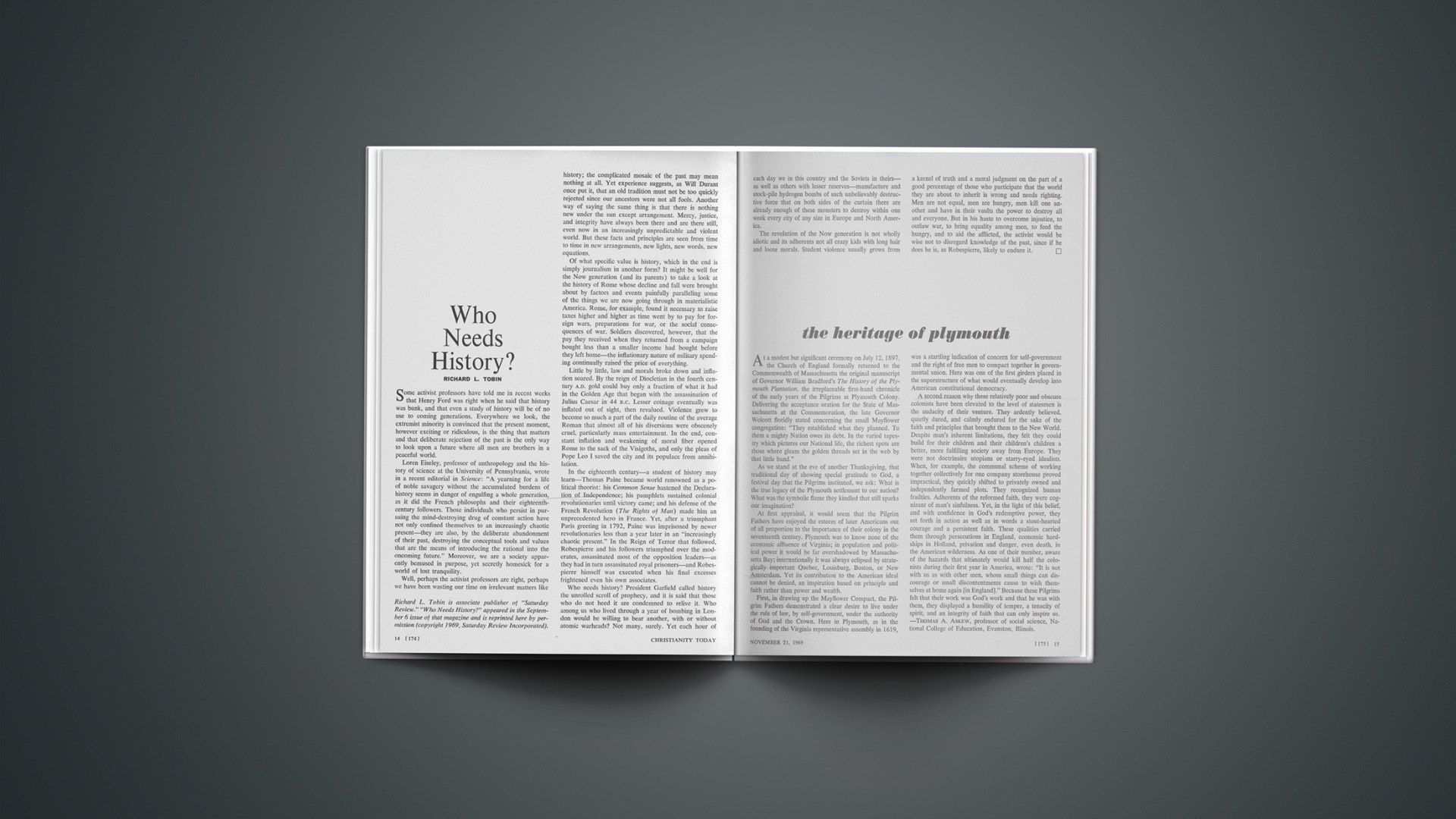Some activist professors have told me in recent weeks that Henry Ford was right when he said that history was bunk, and that even a study of history will be of no use to coming generations. Everywhere we look, the extremist minority is convinced that the present moment, however exciting or ridiculous, is the thing that matters and that deliberate rejection of the past is the only way to look upon a future where all men are brothers in a peaceful world.
Loren Eiseley, professor of anthropology and the history of science at the University of Pennsylvania, wrote in a recent editorial in Science: “A yearning for a life of noble savagery without the accumulated burdens of history seems in danger of engulfing a whole generation, as it did the French philosophs and their eighteenth-century followers. Those individuals who persist in pursuing the mind-destroying drug of constant action have not only confined themselves to an increasingly chaotic present—they are also, by the deliberate abandonment of their past, destroying the conceptual tools and values that are the means of introducing the rational into the oncoming future.” Moreover, we are a society apparently bemused in purpose, yet secretly homesick for a world of lost tranquility.
Well, perhaps the activist professors are right, perhaps we have been wasting our time on irrelevant matters like history; the complicated mosaic of the past may mean nothing at all. Yet experience suggests, as Will Durant once put it, that an old tradition must not be too quickly rejected since our ancestors were not all fools. Another way of saying the same thing is that there is nothing new under the sun except arrangement. Mercy, justice, and integrity have always been there and are there still, even now in an increasingly unpredictable and violent world. But these facts and principles are seen from time to time in new arrangements, new lights, new words, new equations.
Of what specific value is history, which in the end is simply journalism in another form? It might be well for the Now generation (and its parents) to take a look at the history of Rome whose decline and fall were brought about by factors and events painfully paralleling some of the things we are now going through in materialistic America. Rome, for example, found it necessary to raise taxes higher and higher as time went by to pay for foreign wars, preparations for war, or the social consequences of war. Soldiers discovered, however, that the pay they received when they returned from a campaign bought less than a smaller income had bought before they left home—the inflationary nature of military spending continually raised the price of everything.
Little by little, law and morals broke down and inflation soared. By the reign of Diocletian in the fourth century A.D. gold could buy only a fraction of what it had in the Golden Age that began with the assassination of Julius Caesar in 44 B.C. Lesser coinage eventually was inflated out of sight, then revalued. Violence grew to become so much a part of the daily routine of the average Roman that almost all of his diversions were obscenely cruel, particularly mass entertainment. In the end, constant inflation and weakening of moral fiber opened Rome to the sack of the Visigoths, and only the pleas of Pope Leo I saved the city and its populace from annihilation.
In the eighteenth century—a student of history may learn—Thomas Paine became world renowned as a political theorist: his Common Sense hastened the Declaration of Independence; his pamphlets sustained colonial revolutionaries until victory came; and his defense of the French Revolution (The Rights of Man) made him an unprecedented hero in France. Yet, after a triumphant Paris greeting in 1792, Paine was imprisoned by newer revolutionaries less than a year later in an “increasingly chaotic present.” In the Reign of Terror that followed, Robespierre and his followers triumphed over the moderates, assassinated most of the opposition leaders—as they had in turn assassinated royal prisoners—and Robespierre himself was executed when his final excesses frightened even his own associates.
Who needs history? President Garfield called history the unrolled scroll of prophecy, and it is said that those who do not heed it are condemned to relive it. Who among us who lived through a year of bombing in London would be willing to bear another, with or without atomic warheads? Not many, surely. Yet each hour of each day we in this country and the Soviets in theirs—as well as others with lesser reserves—manufacture and stock-pile hydrogen bombs of such unbelievably destructive force that on both sides of the curtain there are already enough of these monsters to destroy within one week every city of any size in Europe and North America.
The revolution of the Now generation is not wholly idiotic and its adherents not all crazy kids with long hair and loose morals. Student violence usually grows from a kernel of truth and a moral judgment on the part of a good percentage of those who participate that the world they are about to inherit is wrong and needs righting. Men are not equal, men are hungry, men kill one another and have in their vaults the power to destroy all and everyone. But in his haste to overcome injustice, to outlaw war, to bring equality among men, to feed the hungry, and to aid the afflicted, the activist would be wise not to disregard knowledge of the past, since if he does he is, as Robespierre, likely to endure it.
Richard L. Tobin is associate publisher of “Saturday Review.” “Who Needs History?” appeared in the September 6 issue of that magazine and is reprinted here by permission (copyright 1969, Saturday Review Incorporated).









